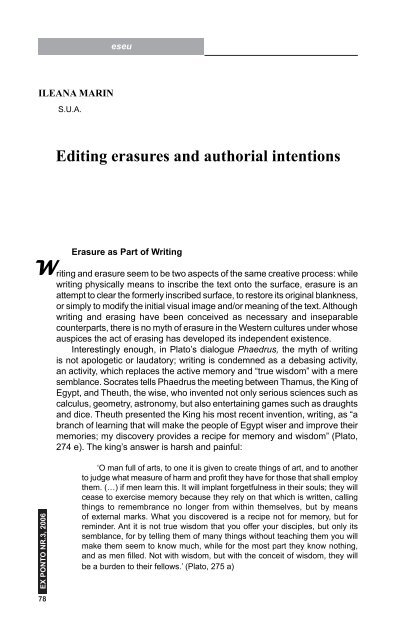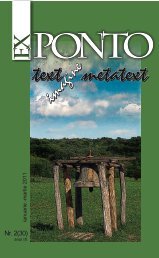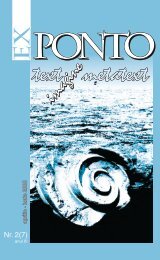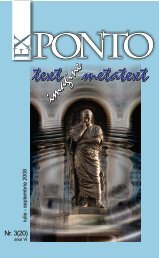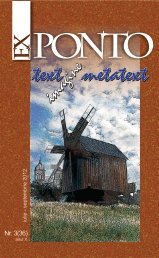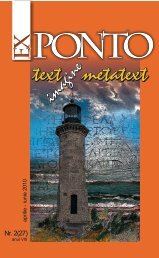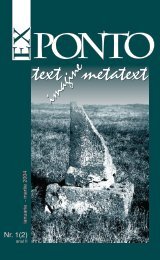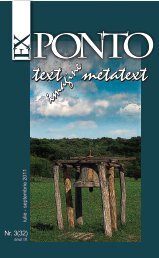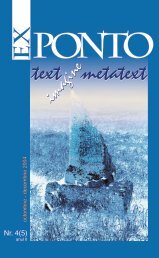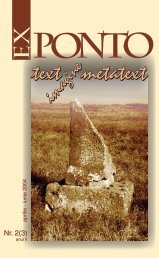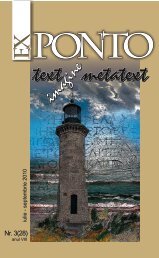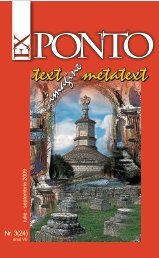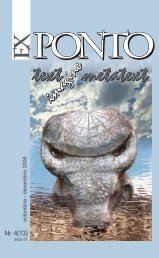- Page 2 and 3:
Ex PontoText/imAgine/metatextNr. 3
- Page 4 and 5:
SUMAR♦EditorialOVIDIU DUNĂREANU
- Page 6 and 7:
editorialOVIDIU DUNĂREANUScriitoru
- Page 8 and 9:
poezieIULIA PANĂ* * *Cum ar trebui
- Page 10 and 11:
* * *m-am trezit în astă diminea
- Page 12 and 13:
IOAN ŢEPELEAPoemele mirării care
- Page 14 and 15:
Mona Lisa pare a acoperi chiar şoc
- Page 16 and 17:
în schimb, asfaltul te dinamizeaz
- Page 18 and 19:
în care ai putea să îţi întinz
- Page 20 and 21:
Un ins orbecăia ca în visOchii -
- Page 22 and 23:
Şi în secunda următoareSă apar
- Page 24 and 25:
CLAUDIA VOICULESCURondeluriDoar ste
- Page 26 and 27:
OLIMPIU VLADIMIROVMulţumireTrec nu
- Page 28 and 29:
prozăFLORIN ŞLAPACO teribilă set
- Page 30 and 31:
Ah, a zis Aloisius, ia uite-l şi p
- Page 32 and 33:
viaţa multor fiinţe zaharisite, a
- Page 34 and 35: crede în ce facem noi. Apoi, câte
- Page 36 and 37: - Dar sensibiloasă mai eşti, se s
- Page 38 and 39: publicul avizat (şi nu numai) al u
- Page 40 and 41: Din somn mă scoală-n miez denoapt
- Page 42 and 43: Lumina cunoştinţii să-i facă ar
- Page 44 and 45: memorialisticăPERICLE MARTINESCUPa
- Page 46 and 47: asta este şi drama ţării mele, a
- Page 48 and 49: provocând pagube importante, deşi
- Page 50 and 51: formidabil, într-adevăr: nouă bo
- Page 52 and 53: 11 iulie Mâine dimineaţă plec la
- Page 54 and 55: locul lor, tejgheaua şi rafturile
- Page 56 and 57: cărui frunze fâşâiau în vânt
- Page 58 and 59: originalul de lângă mine - la sca
- Page 60 and 61: traduceri din literatura românăIL
- Page 62 and 63: Rituella fête met cet être en tra
- Page 64 and 65: elogios, recunoaşterea unanimă. P
- Page 66 and 67: Furtuni înnebunind azurul, scutur
- Page 68 and 69: Mă voi înzdrăveni cu mei proasp
- Page 70 and 71: Cu suflu-i arzător crăpând buzel
- Page 72 and 73: Marin Gherasim - Diptic, 1994, ulei
- Page 74 and 75: IIIMarin Gherasim - Kairos, 2001, t
- Page 76 and 77: Marin Gherasim - Aripă, 2000,ulei
- Page 78 and 79: imagineMarin GherasimUn spirit inte
- Page 80 and 81: Retrospectivă la Muzeul Naţional
- Page 82 and 83: invitat „ex ponto”CARMEN CHIHAI
- Page 86 and 87: Paradoxically, the myth of the unfo
- Page 88 and 89: validate or invalidate the choices,
- Page 90 and 91: versions, even those which contain
- Page 92 and 93: tries to separate the editor’s do
- Page 94 and 95: ConclusionFrom the Platonic myth of
- Page 96 and 97: Fractalul este foarte aproape de pe
- Page 98 and 99: Conceptul de text matricial (aplica
- Page 100 and 101: Proximităţi şi diferenţe, unele
- Page 102 and 103: Citit retrospectiv, Ionescu nimere
- Page 104 and 105: avangardaPAUL CERNATÎntre extremel
- Page 106 and 107: Cu relativă simpatie „revoluţio
- Page 108 and 109: cu un cuprinzător eseu al d-lui Ni
- Page 110 and 111: *În paginile revistei Integral nu
- Page 112 and 113: la „stânga plasticei şi a liris
- Page 114 and 115: geri a separării dintre artistic
- Page 116 and 117: dar cu apucături de satir. Lukrezz
- Page 118 and 119: participa direct la strălucirea su
- Page 120 and 121: situaţii politice, a bravat fără
- Page 122 and 123: Portretul de anarhist, pe care şi-
- Page 125 and 126: Poate nu întâmplător, cel care-i
- Page 127 and 128: mari scriitori români contemporani
- Page 129 and 130: se uite la foaia de/ Hârtie, care-
- Page 131 and 132: la recensământ.)/ -Pe-astea să l
- Page 133 and 134: (…)// Peste câţiva ani/ A înce
- Page 135 and 136:
Ex Ponto nr.3, 2006baston, indifere
- Page 137 and 138:
cronica literarăNICOLAE ROTUNDCons
- Page 139 and 140:
Ex Ponto nr.3, 2006comentează în
- Page 141 and 142:
priveam pe furiş maxilarele descă
- Page 143 and 144:
Ex Ponto nr.3, 2006Nicolae Motoc pr
- Page 145 and 146:
VALERIA MANTA TĂICUŢURăpit pe ve
- Page 147 and 148:
Apelul la miturile precreştine est
- Page 149 and 150:
Ex Ponto nr.3, 2006şi scadenţa M(
- Page 151 and 152:
Ex Ponto nr.3, 2006cel al gepidei A
- Page 153 and 154:
Ex Ponto nr.3, 2006lizare discursiv
- Page 155 and 156:
Ex Ponto nr.3, 2006decât necesară
- Page 157 and 158:
Ex Ponto nr.3, 2006‹‹cochilie
- Page 159 and 160:
cronica literaturii străineADINA V
- Page 161 and 162:
Ex Ponto nr.3, 2006Titlul romanul a
- Page 163 and 164:
de a-l găsi pe cel care a salvat-o
- Page 165 and 166:
Ex Ponto nr.3, 2006158aservirii rus
- Page 167 and 168:
În mitul grec, odată cu suveranit
- Page 169 and 170:
Ex Ponto nr.3, 2006162nu e conţinu
- Page 171 and 172:
Un fenomen care pare pur occidental
- Page 173 and 174:
studii culturaleMARCOS FARIAS-FERRE
- Page 175 and 176:
Ex Ponto nr.3, 2006assume meaning i
- Page 177 and 178:
Ex Ponto nr.3, 2006in rapid transit
- Page 179 and 180:
Ex Ponto nr.3, 2006contingency of t
- Page 181 and 182:
production about the ‘internation
- Page 183 and 184:
Ex Ponto nr.3, 2006Dar peripeţiile
- Page 185 and 186:
Ex Ponto nr.3, 2006(24 dec. 1672 -
- Page 187 and 188:
Ex Ponto nr.3, 20061705, ambii ai P
- Page 189 and 190:
Ex Ponto nr.3, 2006Constantin Brân
- Page 191 and 192:
Ex Ponto nr.3, 2006‘separatist’
- Page 193 and 194:
Ex Ponto nr.3, 2006succedea pe tron
- Page 195 and 196:
al XVII-lea - pentru a ne limita do
- Page 197 and 198:
41Arhimandritul Neofit a ocupat fun
- Page 199 and 200:
o imagine cuprinzătoare a contribu
- Page 201 and 202:
Ex Ponto nr.3, 2006Din subcapitolul
- Page 203 and 204:
Ex Ponto nr.3, 2006Din primul studi
- Page 205 and 206:
să devină fiinţe sociale, căci
- Page 207 and 208:
sociologia cărţiiCONSTANTIN CIORO
- Page 209 and 210:
în biblioteci. Cronicarii literari
- Page 211 and 212:
Ex Ponto nr.3, 2006Lui Debussy îi
- Page 213 and 214:
Ex Ponto nr.3, 2006cumente preţioa
- Page 215 and 216:
Salonul Internaţional de carte „
- Page 217 and 218:
Ex Ponto nr.3, 2006scriitorii înş


